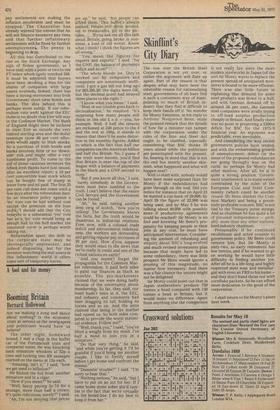Skinflint's City Diary
The row Over the British Steel Corporation is not yet over; or rather the argument will flare up again. Part of the reason is that despite what may have been the ostensible reason for nationalising steel, governments of all hues find it such a convenient way of mani.pulating so much of British industry that they find it difficult to keep their hands off it. No wonder Sir Monty Finniston, in his reply to Anthony Wedgwood Benn, made the pointed remark that the details of how far a minister can tamper with the corporation under the rules of the Iron and Steel Act ought to be clarified, especially considering that BSC thinks 10 years ahead while the politicians are preoccupied with the present. So, bearing in mind that this is not the end but merely another skirmish, what happened and what will happen next?
Well to start with, nobody would have been more surprised than Sir Monty if the redundancies had gone through on the nod. Did you notice for instance that on April 23 he wanted a cut-back of 20,000, by April 29 the figure of 22,000 was being used, and by May 5 he was : talking about 40,000 with possibly more if productivity agreements could be reached? Sir Monty is no, fool and knowing Mr Benn's pro' pensity for keeping people in their jobs at any cost, he must have anticipated intervention. Considering the amdunt of rehashing and enquiry about BSC's long-evolved and much revised investment plan because that might have led to some redundancy, there was little prospect Mr Benn would ignore a pruning of this magnitude, no matter how necessary. And there was a fair chance the unions might not be delighted.
Sir Monty could point out that in Japan steelworkers produce 750 tonnes a head compared with 150 tonnes a head in Britain,' but it would make no difference: Apart from anything else the comparison is not really fair since the more modern steelworks in Japan (of the sort Sir Monty wants to replace the present spread of antiquated monsters) is bound to be more efficient. There was also little future in explaining that demand for some steel products was down to a half, and with German demand off by around 34 per cent, the German steel companies were avidly trying to off-load surplus production cheaply in Britain. And finally there was no point in projecting a £200m deficit for BSC for the 1975/6 financial year. An argument was predictable, even inevitable.
And considering the way recent government policies have tended, and with the embarrassing growth of unemployment, defeat (in the sense of the proposed redundancies not going through) was on the cards. So perhaps Sir Monty had other motives. After all, he is in quite a strong position. Government interference is to some extent constrained by the rules of the European Coal and Steel Community (which could be another reason Mr Benn dislikes the Common Market) and being a potentially profitable concern, BSC is not tied to the Treasury purse strings. And as chairman he has quite a lot of personal independence — probably more than any other nationalised industry chairman.
Presumably if he continued recalcitrant and acted counter to government policy, Mr Benn could remove him. But Sir Monty is sixty-two, so early retirement has few terrors, and if he wanted to go on working he would have little difficulty in finding another job. After all he is a life-long and highly respected steel man and metallurgist with even an FRS to his name — and they don't hand those out with cornflake packets. So he can afford more dedication to the good of the corporation.
I shall return to Sir Monty's plans next week.


























 Previous page
Previous page